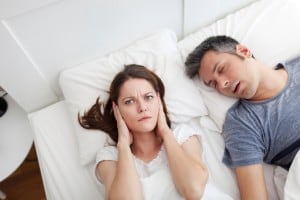Signs Of Sleep Apnea And How Oral Appliance Therapy Can Help

Loud snoring – especially when it’s accompanied by daytime fatigue – may be a sign of sleep apnea.
In this blog, the sleep apnea specialist at eos dental sleep will explain the signs of sleep apnea and how oral appliance therapy can help.
What is sleep apnea?
Sleep apnea is a serious disorder that causes you to stop breathing during sleep. This can happen hundreds of times a night without you even being aware
of it.
This is typically a chronic condition that interrupts your sleep and leads to excessive daytime sleepiness. It has also been linked to serious overall health issues such as diabetes and heart disease.
What are the signs of sleep apnea?
It can be difficult to identify the signs of sleep apnea on your own, since the most prominent symptoms only occur when you’re asleep.
Common signs of sleep apnea include any of the following:
- Loud and chronic snoring almost every night
- Gasping for air or making choking sounds during sleep
- Pauses in breathing
- Abruptly waking up and feeling short of breath
- Daytime sleepiness and fatigue, even if you seem to be getting enough sleep
- Morning headaches
- Attention problems
- Memory loss
- Dry mouth or sore throat when you awaken
- Irritability, depression, and mood swings
What are the risk factors for sleep apnea?
There are certain risk factors associated with sleep apnea, including:
- Excess weight: Obesity can quadruple your risk of sleep apnea because fat deposits around your upper airway may obstruct your breathing.
- Neck circumference: A thicker neck (greater than 17 inches for men and over 15 inches for women) may mean that you have a narrower airway.
- Narrowed airway: Some people naturally have a narrow throat, or you may have enlarged tonsils or adenoids that are blocking your airway.
- Gender: Sleep apnea is twice as common in men as in women.
- Age: Sleep apnea is more common in people older than 60.
- Family history: If you’re related to someone with sleep apnea, your chances of also having it are greater.
- Race: If you’re under the age of 35, African-Americans are more likely to have sleep apnea. Hispanics and Pacific Islanders are also at increased risk.
- Alcohol, sedatives, or tranquilizers: Especially if they’re used before bedtime, these substances can relax the muscles in your throat while you sleep.
- Smoking: If you smoke, you have triple the risk of obstructive sleep apnea compared to someone who has never smoked.
- Nasal congestion: If you have difficulty breathing through your nose due to an anatomical problem (such as a deviated septum) or allergies, you’re more likely to develop obstructive sleep apnea.
How can oral appliance therapy help my sleep apnea?
Oral appliance therapy is a proven treatment option that involves wearing a small, custom-designed plastic device that’s placed in your mouth. Similar to a sports mouth guard, an oral appliance is worn at night to help prevent the collapse of the tongue and soft tissues in the back of the throat. This helps keep the airway open, allowing for adequate air intake.
Many patients who aren’t able to tolerate the traditional CPAP machine because of noise and discomfort are able to successfully wear oral appliances.
What are the benefits of oral appliance therapy?
Over time, most patients experience significant improvements in sleep apnea symptoms with the use of oral appliance therapy.
Oral appliance therapy offers the following benefits:
- Oral appliances are custom-made to fit you, so they’re comfortable and easy to wear.
- They’re a non-invasive form of snoring and sleep apnea therapy, so no surgery is required.
- They significantly improve sleep apnea symptoms including oxygen saturation and daytime sleepiness.
- Oral appliances are small and convenient for travel.
- Patients have a higher compliance rate with oral appliances than with CPAP.
Where can I find oral appliance therapy in Philadelphia?
At eos dental sleep, we specialize in oral appliance therapy for the treatment of sleep apnea. Our goal is to help you get a quiet, restful night's sleep in order to improve your overall health and the quality of life.
After a thorough examination, our dental sleep medicine specialist, Dr. Marc Levin, will determine if an oral appliance will help alleviate your sleep apnea. If so, we’ll select the best type of appliance to suit your specific needs.
Schedule an appointment at our Philadelphia office today to learn more about oral appliance therapy to treat your sleep apnea.
